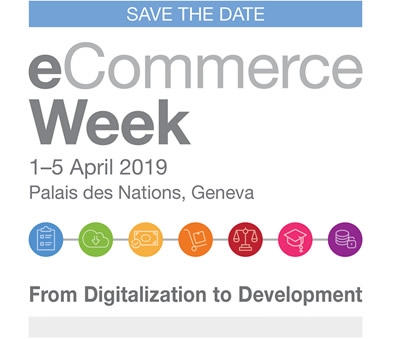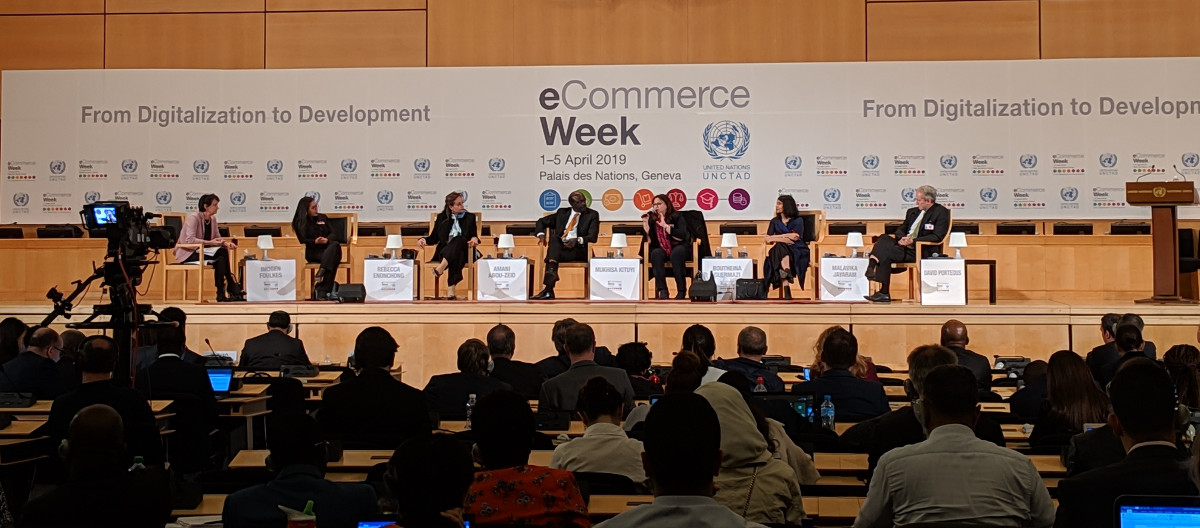High-level dialogue: From digitalisation to development
2 Apr 2019 15:00h - 17:30h
Event report
[Read more session reports and live updates from the UNCTAD E-commerce Week]
The session was moderated by Ms Imogen Foulkes (BBC Correspondent) who explained that the panel discussions would revolve around questions of the existence of a digital divide and whether all participants of the global eCommerce ecosystem were benefitting equally from digitalisation.
Mr Mukhisa Kituyi (Secretary-General, UNCTAD) expressed his satisfaction with the 5th edition of UNCTAD’s eCommerce Week and highlighted that this year more than 1200 delegates from 120 countries would be attending the event.
Kituyi cautioned against simplistic analyses according to which digitalisation and growing connectivity will solve all problems and noted that the issue is not only about increasing connectivity but also about how to leverage it. Nonetheless, he warned against focusing too much on the downside of digitalisation and said that cases such as the Facebook-Cambridge Analytica case were fuelling concerns of consumers.
He underlined the necessity of finding wholesome approaches to challenges posed by digital commerce and mentioned promising international efforts such as the OECD Going Digital Summit which aims at preparing member states for digital disruptions. Kituyi mentioned other initiatives such as UNCTAD’s first Africa eCommerce Week which was attended by almost 2000 participants, UNCTAD’s partnership for eTrade, as well as UNCTAD’s eReadiness Assessments which have been conducted in 17 countries. He pointed out that more support is needed to close the digital divide.
Kituyi expressed concerns about how to bring the remaining 50% of the world’s population online given that profit margins for many sectors are decreasing due to increased competition and that the gap between rural and urban populations is widening. Besides problems of lacking infrastructure in developing countries, Kituyi mentioned that many of the countries which are lagging behind in Internet connectivity are often governed by leaders who do not see the benefits of being part of the global Internet ecosystem. Populations of such countries are thus difficult to convince of the potential of digital tools given that they have never interacted with them.
According to Kituyi, the best way to make eCommerce more inclusive is through the identification of best cases and through eReadiness Assessments which have proven very successful.
Ms Amani Abou-Zeid (Commissioner for Infrastructure and Energy, African Union Commission) noted that the African continent as a whole is closing the digital gap very quickly. However, she pointed out that very important differences among countries but also within countries, especially between rural and urban areas, remained.
Especially high costs for Internet connectivity were mentioned by Abou-Zeid as a barrier for integration. Moreover, she identified language-specific and relevant content as additional challenges in closing the digital divide and said that these aspects must be taken into account in order to avoid aggravating the digital divide.
Ms Boutheina Guermazi (Director, Digital Development, World Bank) underlined that it took 50 years to get 50% of the global population online and emphasised the need to get the missing 50% online much faster given that the digital economy will soon represent 25% of global GDP.
She spoke about the World Bank’s Digital Moonshot Initiative for Africa which tries to provide holistic solutions and is based on five foundational elements, such as digital infrastructure, platforms, digital payments, digital skills, and entrepreneurship.
She explained that this initiative, which is being implemented with the African Union’s digital strategy, tries to make sure that people become active participants and producers of eCommerce and not only remain consumers of it.
Guermazi noted the importance of adopting regional approaches given that these spaces allowed for greater scalability of solutions and that only this way, barriers such as cross-border trade and regional connectivity can be overcome.
Ms Rebecca Enonchong (Founder and CEO AppsTech, Board Chair of AfriLabs, Vice-President of African Business Angels Network) introduced AfriLabs, a network of innovation hubs of the African continent that created a framework of policy recommendations which they, as digital entrepreneurs, would like to see implemented. She noted that while some countries have been starting to take these recommendations into account, policies are generally lagging behind, thereby affecting the development of eCommerce.
She highlighted that connectivity is key for digital commerce and that ’the Internet is the oxygen of the digital revolution’. She further noted that as digital economies are maturing, they are being regulated in the wrong way. Therefore, policies of Internet shutdowns or other types of impediments deeply hurt the growing digital economy. She urged policymakers to invest in reducing the cost of Internet connectivity and said that before trying to regulate the young eCommerce in Africa, governments should make use of the information they can now obtain about the informal sector. This sector is increasingly using mobile apps and mobile finances which produce valuable information for policymakers.
Enonchong highlighted that governments should trust the companies more and give them the chance to establish themselves before regulating them. She said that most experiences of digital entrepreneurs with governments were negative (i.e. Internet shutdowns, foreclosures due to the lack of understanding of digital business models, significant tax burdens on small enterprises). She, therefore, welcomed the dialogue at the international level.
Ms Malavika Jayaram (Executive Director, Digital Asia Hub) expressed concern about social matters becoming commercialised such as social credit systems and access to private user data. She said that there is a necessity to put human rights concerns more into the centre of the discussion given that the rights are enforceable as opposed to ethical concerns and issues of trust, which are not. Additionally, she advocated for the participation of stakeholders of the developing countries in digitalisation debates in order to avoid delivering a top-down form of development aid which does not reflect the needs of people.
Jayaram also mentioned the responsibility of platforms and the private sector. She disagreed with the idea of pushing down the responsibilities of governments onto the public. While digital literacy, fact-checking and other types of mechanisms should be taught to people, companies and governments have a greater role in protecting the population. Particularly companies should accept to make changes at the inception level of new products and adjust their platforms given that only they can make changes at a significant scale.
Moreover, she criticised the idea of tradeoffs in the digital sector according to which privacy partly needs to be abandoned in exchange for a free service. According to Jayaram, this narrative allows companies to completely evade responsibility.
Mr David Porteous (Founder and Chair of BFA and Co-founder and Chair of Digital Frontiers Institute) noted that access gaps are closing at different rates and that other questions besides connectivity merit a closer look. Acknowledging that the Internet facilitates the entering of the world of work, Porteous posed the question of whether people can sustain themselves through eCommerce. In Africa, only 20% of the people working in the digital economy can sustain themselves through their work. While there are efforts to outsource some of the work to the 80% who cannot live of their digitally-related work, governments should look into strategies to address this issue.
Porteous mentioned that people in developing countries often use social media platforms as a means of production and marketing. He explained that these entrepreneurs conceded that while the tools were helping them, their use increased their stress levels and the pressure to deliver. Governments should, therefore, take note of that type of challenges and refrain from making too strong distinctions between the formal and the informal sector. According to Porteous, these distinctions are blurred in the context of eCommerce.
Regarding the question of responsibility of the different actors, Porteous said that responsibility should be discussed within national settings and that the question of what it means to build trust should be explored locally. According to him, trust-building involves adopting effective recourses when things go wrong and taking responsibility for actions.
The Vice-Minister of Trade of Panama explained that forward leaps in the digital sector cannot be achieved without the private sector. He further noted that the responsibility of states concerns not only the support and empowerment of small and medium-sized enterprises (SMEs) in the digital economy but also of taking consumer concerns into account, for example through data management or privacy policies.
According to him, the challenge for governments lies in creating adaptive solutions and not to be outgrown by technological developments. He noted that the question is not about whether or not to participate in eCommerce but rather about what governments can do to ensure its inclusivity.
Ms Yvette Sylla (Minister of trade of Madagascar) explained that Madagascar’s strategy to enhance eCommerce in the country was elaborated on the basis of UNCTAD’s eReadiness Assessment. She underlined the importance of governments to invest in infrastructures to provide the digital economy with the necessary support.
Mr Brian Wong (Alibaba) noted that the world is on the verge of creating a new development model using technology and that the thresholds for technological adoption are now lower than ever. This creates a new economic paradigm. While the previous paradigm was a zero-sum game, data’s reusability allows a multitude of actors to benefit from it and use it for their respective commercial purposes.
Additionally, Wong said that network effects create benefits for all and that the risk of monopolies is far lower in the digital economy. He identified the ability of companies to stay ahead of innovations as the biggest threat to their survival in a fast-changing environment such as eCommerce.
By Cedric Amon
Related topics
Related event

eCommerce Week 2019: From Digitalization to Development
1 Apr 2019 15:45h - 5 Apr 2019 15:45h
Geneva, Switzerland

